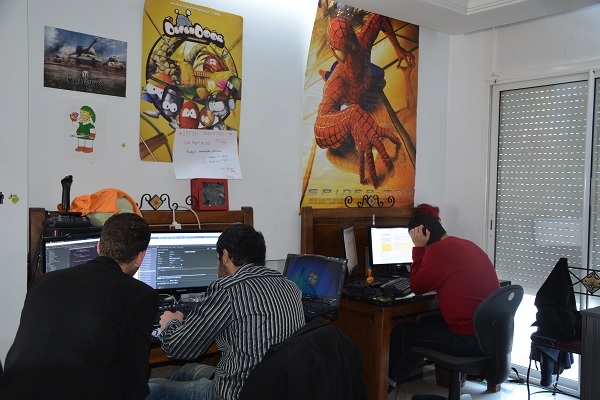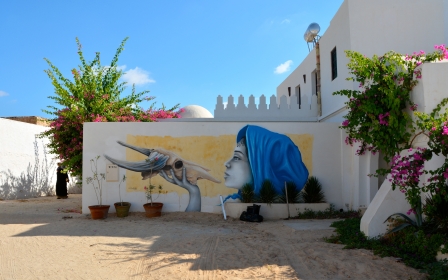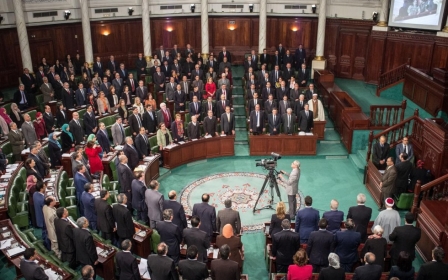Game developer determined to put Tunisia on the map

Three years after the revolution, Tunisia has politically been a success story, finalising a new constitution and securing three democratic elections. Though economic development has been slow, a growing new generation of young, motivated entrepreneurs is defying the lack of governmental reforms and foreign investments.
One entrepreneur that is leading the way is Walid Sultan Midani, the founder of Tunisia’s first video game development company, DigitalMania. “We want to make games that have an added value,” he said when we met at his office, “not just a game for gaming.” While many of his friends left Tunisia for New York or London, Midani decided to stay and contribute to the changing Tunisian business environment, a decision he has not regretted.
Today he is employing 13 young and motivated individuals, in an office situated in a villa in an up-market Tunis suburb. “Here we have everything,” said Sami Zalila, who joined the team in 2014 as community manager, as he took me on a tour in the big house, which is decorated with game posters, confetti and awards.
“There are even showers and a small garden,” he said. “We want people to be creative,” explained Midani. “We ask them to think outside the box, so we don’t put them in a box.” However, like for most entrepreneurs, the road has been everything but straight forward for the game developer.
Bumpy road
For Midani, as for many entrepreneurs here, it all began at the now famous engineering university, Esprit. The school started with around 30 students. “I was one of the first students there,” Midani said. Today there are almost 4,000 students and it has become an important player in the engineering sector. “That is where it all started,” he said and it was also where Midani went when he needed to find motivated people to join his team.
In the beginning, the team of six, borrowed office space from Midani’s father and had a daily budget of 5 dinars per day per person. “We got a sandwich and a soda,” Midani said with a laugh. But giving up was never an option, besides, he said, they had a lot of fun.
In 2012 DigitalMania was officially established and all focus was on one game, DefenDoor. The concept of the game is to defend one’s door from different enemies. You enter the arena where the battle is happening and at the same time that you are defending your door, you also need to attack your enemy’s door. At your disposal are hundreds of different “zorbs” - tiny, but very dangerous characters with different powers. The game was never a success, but the team learned and grew from their mistakes, Midani said. “It’s a marathon and not a sprint.”
Midani grew up in an entrepreneural family and was raised with the mentality that you have to count on yourself. “I think I was born an entrepreneur,” he said, describing how he, at age 14, started selling jeans he picked up at the local market for 7 dinars and sold to his classmates for 70. A good price he said with a wink. Seventeen years later, DigitalMania is three-years old and has developed 35 games, five of which are the company's own product.
Tunisia on the map
The team’s biggest challenge has been to convince people that video games are not only for kids and “nerds,” and are not necessarily dangerous or brainwashing. DigitalMania’s ambition is not to develop another war game, Midani said. Instead the team would like each game to contain an element of education. Midani pointed out that video games have a huge impact on a lot of people, it is an important communication tool and that he wants to also touch on important issues such as corruption, drugs and malaria.
Another important aim for DigitalMania is to put Tunisia on the map. “We want to increase people’s knowledge of Tunisia.” In the game Defendoor for example, when a player dies he can either buy one brik (a Tunisian deep-fried pastry dish), which gives him one life or a leblebi (a traditional Tunisian chick pea stew), which will give him 10 lives. A click on the dishes will give the player a short description of the story behind that traditional plate.
DigitalMania also wanted the game’s characters to have Tunisian names but which were comprehensible to an international audience. So Midani wrote down a list of names and called his friends in the Netherlands, UK and the US, and asked them to pronounce Tunisian names like Houta and Aadh'am. Midani made a disapproving gesture with his hand and said, “They were quickly taken off the lists.” Instead, names like Super Batata, Ftila and Dabdoub were proven easier for the international audience to pronounce and are today part of the game’s characters.
Midani has many ideas on future video games. He would even like to make a game focusing on historical events. “If the players know one more thing after playing our game we will be happy about that,” he said. There is a lot of important history here, Midani said proudly. “Perhaps we can teach them, for example, about Hannibal.” The life of the great military commander, most known for being one of history’s best strategists, would make for a great adventure, Midani said.
But one of the challenges that DigitalMania is facing is finding a balance between including educational elements and still attract a large mainstream audience. “But if it wasn’t difficult everybody would be doing it,” Midani said. “We put the bar high because we want to be in a niche with few players.”
Future challenges
Some of the challenges that Midani mentioned are related to the Tunisian market. For example investment, Midani said. “The investment side needs to understand the entrepreneurship side better.” The market is also relatively small and there is still a lack of confidence, many are unaware of the business path and are afraid to take risks. The solutions for Tunisia’s entrepreneurship sector will not come from the government, he argued. “It has to come from the private sector.”
But the 31-year-old IT-entrepreneur is optimistic about Tunisia’s future in terms of entrepreneurship. He is impressed by how quickly the ecosystem has grown to today include incubators, accelerators and investors. Just a few blocks away from DigitalMania’s office one can find the country’s first co-working space, Cogite, which was created to host the country’s new game changers. “Networking and assistance are key ingredients to build a sustainable entrepreneurship environment,” explained Houssem Aoudi, Cogite’s co-founder. He is, just like Midani, optimistic about Tunisia’s new entrepreneurship community, “We have everything to become the next Silicon Valley,” Aoudi said.
There are many initiatives like Cogite today, Midani said, with the goal of helping people interested in starting their own business. However, in order to become a new Silicon Valley, there needs to be more cooperation between the different initiatives, he said. Midani said he would like to see more Tunisians try their luck. “We need to attract more people to become entrepreneurs.” For sure you will face different obstacles along the way, he said. To begin with you need a good team, “and every time you make a mistake you need to learn from it,” Midani advised his counterparts. Nonetheless, Midani remains humble, “We are still on the road to success,” he said. “Our story is successful because we are still alive, we’ve heard the phrase: 'In six months you will be dead,' for a very long time now.”
New MEE newsletter: Jerusalem Dispatch
Sign up to get the latest insights and analysis on Israel-Palestine, alongside Turkey Unpacked and other MEE newsletters
Middle East Eye delivers independent and unrivalled coverage and analysis of the Middle East, North Africa and beyond. To learn more about republishing this content and the associated fees, please fill out this form. More about MEE can be found here.




